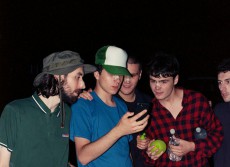A lack of self-awareness : Interview with Nico Young
NeoL / 2017年10月12日 17時25分

A lack of self-awareness : Interview with Nico Young
「New York Time Magazine」のカバーを飾った、Nico Youngの写真を見たことはあるだろうか。セレブでもモデルでもない、高校の同級生たちをただありのままに写しただけのように見える写真。けれどもその表情や空気、構図には、見るものを惹きつける特別な才能を感じずにはいられない。この夏に高校を卒業したNicoに、彼の写真について、いまの彼自身の現状とLAのムードについて聞いた。
———まずはバックグラウンドなど、あなた自身について教えてください。
Nico「18年前にカルフォルニア州のサンタモニカで生まれた。母親はニュージーランド出身で、父親はニューヨーク出身。数ヶ月前にサンタモニカ高校を卒業して、UCLAに通い始めたばかりだよ」
——写真を始めたきっかけは?
Nico「中学生の時にサマーキャンプで働いたことがあるんだけど、そこで初めて写真を撮り始めたんだ。写真のクラスを受け持っていた先生のアシスタントだったから、小さい子に写真の撮り方を教えつつ、自分自身も習い始めて。それ以来、学校にカメラを持って行っては休み時間に友達の写真を撮るってことを何年間もやっていた。で、家に帰ったらそれをFacebookに投稿するのが習慣だった。高校に入ってアートや写真への興味が膨らんだことで更に上達したと思うけど、高校3年でフォトグラフィーのクラスをとるまでは正式なアートの授業を受けたことはなかったんだ。先生に自分で選んだテーマで写真集を作るという課題を出されたことで、真剣に写真を撮り始めた」
——あなたの写真には相手との長い付き合いを感じさせる親密さを感じるのですが、その距離感を得るためにも撮る際に意識していることはありますか?
Nico「普段からできる限りカメラの存在を薄くすることは心がけている。フィルムで写真を撮るから、枚数はそんなに取らないし、撮った直後に見返したりしない。だからカメラにあまり夢中にならずに済むし、その場で何が起こっているか把握しやすいと思う。写真を撮るときは、場の雰囲気にかなりこだわる。周りにいる人との間に本当に落ち着いた空気が流れていないと、カメラを取り出せないんだ」
——自然な表情を写していながらも、構図や画角、色などの視覚的なセンスが卓越していると思います。動物的な直感でシャッターを切っているのか、それとも計算された構図なのか知りたいです。
NIco「ありがとう! おもしろい感じに人が並んでいたり、光がいい感じだなって気がついたときにはもう大体準備ができているんだよ。いいタイミングで写真撮っているだけで、考えこんだりはしないかな。写真を撮ったら、現像するまでその写真のことは忘れてる」
——なるほど。そのセンスは撮り続けるなかで独自に培われたもの?それともアートブックやフォトブックから学んだもの?
Nico「好きな芸術作品や写真に影響を受けているのは間違いないけれど、具体的にどう影響を受けたのかはわからないな。高校2年の時に、アートブックを買い始めたり、美術館を定期的に訪れようになって、自分が撮る写真に大きな変化があったことに気が付いたんだ。物事の見方が全体的に変わって、それにつれて写真も変わったんだと思う」
——あなたの作品は身近な生活を切りとったドキュメンタリー写真として紹介されることが多いけれど、インスパイアされる対象がそのような身近な人やものなのでしょうか。
Nico「僕の写真のほとんどは友人たちと過ごした瞬間を覚えておくためのものだよ。ただ、写真集やプロジェクトに向けて撮影しているときのほうが、より懸命に効率よく仕事ができるんだよね。何を求めているかが明確なほうが、物事がはっきり見える」
——被写体に求める要素や魅力は?
Nico「無自覚であること。無理に何かになろうとしていない、自然な佇まいのなかにある美しさが好きなんだ。何かにすごく集中していたり、誰かの話を聞いていたりして、カメラの存在に気がついていないときこそ、とても魅力的に見える。カメラの存在に気付くと、人は誰でも自然とポーズをとったり、良く見せようとしてしまって、僕が見つけた“イメージ”はどこかに失われてしまう」
——普段どうやってモデルを探していますか。
Nico「僕の写真に写っているのはみんな身近な人ばかり。友達や、学校のクラスメイト、同じコミュニティの子たち——僕がいるところにあらかじめ存在していた人たちなんだ。無意識にだけど、特に撮りたくなるような友だちもいる。彼らは気取ってないし、カメラの存在なんかに影響されない。すごくクールなんだ」
——あなたの写真には独特の間があって、それがドラマティックさを醸し出しています。間の重要性をどのように感じていますか。
Nico「“The pause.” その表現いいね。人が口を閉じているときや、なにかを聞いたり、見ているだけだったり、そういう瞬間を場面の中で待ってるのかな。そういうときに、シャッターを押すんだ」
——将来的には作り込んだファッションシュートなどもトライしたいですか。どのような写真家になりたいのか、憧れやロールモデルがいたら教えてください。
Nico「ファッションシュートや作り込まれた撮影にはあまり興味がない。人にポーズをとらせたり、配置させたりするのが苦手なんだ。将来、雑誌のフォトジャーナズムはやってみたいし、そういうのが僕の得意分野だと思う。僕が尊敬している写真家のほとんどは、僕くらいの年齢ではまだ写真に興味がなかったらしくて、そう考えると僕は今からだって何にでもなれると思える。もしかしたら、将来は写真家じゃないかもしれないしね」
——使っているカメラはなんですか。
Nico「Canon EOS A2EとMamiya 7で撮影することが多いかな。Mamiya 7の画像は本当に美しいけれども、使っている最中に沢山調整したりしないといけなくて、Canon A2Eは自動焦点があるから、そっちのほうがいい写真が撮れる。Mamiyaだと、焦点を合わせたに時には撮りたかったイメージがもうなくなってるいるんだよね」
——オリジナリティのある写真にするために、撮るとき、そして撮った後の編集作業で気をつけていることは?
NIco「Kodak Ektar filmが出した色味が気に入ってる。そのフィルムを一番使うんだけど、ネガをスキャンした後は色の調整をする必要は滅多にないよ。フィルムのネガティヴをスキャンした後に、一片のほこりを消すのに何時間もかける時はある。だけど、それ以外に編集することはほとんどない」
——New York Time Magazineでのあなたのカバーストーリーは非常にセンセーショナルでした。あのオファーがきたときに最初になにを考えましたか。そしてカバーストーリー後、変わったことはありますか?
Nico「雑誌のフォトディレクターのKathy Ryanと連絡を取り始めたときは、それが何か発展することになるとは思っていなかったんだ。高校の写真の先生Mr. Ledfordが、僕が作った写真集のデジタルコピーをKathyに送ったんだ。その後彼女と数週間話し合って、高校生活の撮影するというお題をもらった。その課題を5ヶ月くらい続けてたんだけど、印刷する週になるまで雑誌のカバーストーリーになるとは気づいてなかった。その雑誌が出てから、僕の人生はすごく変わったよ。素晴らしい体験だった」
——高校生活でのいい思い出と悪い思い出を教えてください。
Nico「高校では本当にいい時間を過ごせた。友達も好きで、彼女も大好きで、パーティーはあんまり行かないけど、宿題を終わらせるために毎晩遅くまで起きていて、授業に寝てばっかりだった。大学に入りやすくなるために、したくないことを無理やりさせるような親じゃなかった。学校新聞のために文章を書いたり、写真を撮ったり、スケートボードを楽しんで、高校の最高学年のときに、もっとも芸術的な人という部門で1位をもらって、スタイルの部門では2位だったよ。水曜日には髪を剃って、木曜日には美術館でインターンシップをして、金曜日の放課後は近くの古着屋さんに行ってた。全部、結構曖昧な記憶なんだよね。あの日の昼休みって感じでは覚えてなくて、そこにいるときのムードや友達がどういう感じだったかとかは覚えてるんだ。何を話してたとかは記憶にないな。最高学年の時に、ドナルド・トランプが大統領になったり、すごく好かれていた生徒が5人も亡くなってしまった事件もあった。みんなにとって、とても辛い時期だったんだ」
——いまのLAのユースカルチャーはどうですか。みんなはなにに夢中になり、あなたはそれをどう見ているのでしょう。
Nico「多岐に枝わかれしているから、LAのユースカルチャーが一般的にどういう感じかを語るのは難しいな。LAは大好きだけど、LAの将来は不安だよ。いま、すごく急速に変化が起きている。ダウンタウンLAは5年前とは全く違って、画一化や採算性重視が進んでいる。ローカルなお店は大手企業に買収され、僕が好きな本屋さんはどんどん閉店していくし、フィルムを現像してくれるところもほとんどないし、不動産が僕らの神聖な場所を全て崩壊しつくしたんだ。
ユースカルチャーは、その急速な変化に寄り添う影のようなものだと思っている。新しい電車のライン、Uberや公共自転車の設置によって移動は便利になったけど、行く場所が減った。ライヴ会場やギャラリーが減っていく一方で、世界中の全てのモールが全く同じものを売る同じお店で埋め尽くされていってる。キッズは先生に気づかれない電子タバコにハマるようになったり、空っぽの駐車場でスケボーをしていても警備員に追い出されるようになったり、スケートパークでトリックを練習してる人たちはみんな、インスタグラムに載せるために映像を撮ってる。みんな異常なほど自分のイメージを気にしていて、どのプロフィールも丁寧に作り上げられている。もう何を信じていいかわからなくなるよ。社会運動も流行りになってしまって、不誠実ですらある。全て僕たちのせいだけど、美術館すらSNS上でフォトジェニックに写るような、”インスタグラム映え”する作品ばかり。美術館は壁にペンキでハッシュタグを書くしまつだよ。街中で見かける壁画にはアーティストのインスタグラムのアカウント名がサインされている。ユーザーネームはトイレの壁にまで彫られているし、詩の朗読会で叫ばれる。ローカルなレストランまで、食後にネットでの口コミを頼んでくるようになった。パブリック・スフィア(公共圏/公衆が作り出す概念、世論など)はオンライン・メディアに影響されすぎて、もはや的外れなものになっている」
——では、あなたにとってのユースとは?
NIco「ユースは試練と失敗、自由と、発見の時期」
——将来、映画制作に興味はありますか?
Nico「うん。映画は大好きだから、映画関連のことができたらとても嬉しいな。写真を撮るようになる前は、いろんなビデオを作っていたんだ」
——好きなミュージシャンやバンドを教えてください。
Nico「Cody ChesnuTT, Frank Zappa, R. Stevie Moore, This Mortal Coil, Gil-Scott Heron, Rodriguez, Arthur Russell, Sui Zhen」
——5年後と、近い将来の自分はなにをしていると思いますか。
Nico「5年後は安定した生活を送っている。近い将来はアートスクールに通っている」
——最後に、なにか知らせておきたいニュースがあれば。
Nico「UCLAの寮に引っ越したばかりで、新しい友達をたくさん作っていて、人生が急激に変化しているところだよ。アートを勉強しているけど、写真についてどれくらい学べるかは今の時点ではまだはっきりしてないんだよね。それは少し不安だけど、新しいことに挑戦するのも楽しみにしてる。今学期は陶芸の授業をとるんだ」
Photography Nico Young
interview & edit Ryoko Kuwahara
editorial assistant Kosei Wakabayashi
——Can you tell us about yourself?
I'm from Santa Monica California, I was born here 18 years ago. My mom is from New Zealand and my dad is from New York. I graduated from Santa Monica High School a few months ago, and now I am starting university at UCLA.
——Can you tell us about your photography?When and How did it started? Did you start taking photos of
the people around you because you were instructed by a teacher? Or did you start taking pictures of your surrounding naturally?
I first got into photography while working at this summer camp when I was in middle school. I was an assistant to the instructor of the photography class, so I spent the summers teaching little kids how to take photographs, while simultaneously learning how to myself. After those summers I started bringing my camera to school and taking photos of my friends at lunch. I did that for years. I would take photos at school and then go home and post them on Facebook. As I became more interested in art and photography in High School, my photography evolved. I didn't take a formal art class until my junior year of high school, when I took photography. My teacher assigned us to make photo books on topics of our choosing. That was when I really started taking photography seriously.
——Your photos are very intimate and I can feel that you’ve had a long relationship with the people in your photographs, but is there anything you deliberately do when taking photos? For example, having the models not worry about the camera rolling.
I usually try to minimize the presence of the camera as much as possible. I shoot on film, so I don't take many photos in the first place. And since I can't look at the pictures immediately after I take them, I'm less involved with the camera, and more present in what's actually going on. I'm very particular about the kind of social atmosphere I shoot in. I have to be really comfortable with the people around me to even feel compelled to take out my camera.
——Despite the raw expressions you capture, the composition and the angles, and the colors of the photos are seriously full of good taste. When you release the shutter, do you do it with your gut feeling or do you do it with consideration?
Thanks! I'll usually be on guard when I notice a set of people arranged in an interesting way, or if the lighting is nice. Then I'll take the photo when the moment seems right. I don't think about it too much. I take the photo and I forget about it until I get the film processed.
——Did you cultivate the good sense you have just by yourself? Or did you learn it from some art books or photography books? Or a mix of both?
I'm sure my photography is influenced by the art and photography I appreciate, but I wouldn't be able to pinpoint how. I notice a major progression in my photography around my sophomore year of high school, when I began buying art books and visiting museums regularly. My entire way of seeing changed around then, and so did my photography.
——You have really good taste in the words you select for all of your titles and captions. It’s outstanding. How do you decide the titles? How do you think of the relationship of the photo and the words that explain it?
I rarely choose to caption or write about my photographs. I'm too self-conscious about my writing, I often feel my words do harm to my photos. Sometimes I'll give the names of the people in the photo.
——A lot of the works are like documentaries, but are there scripts for all if them?
I work much more diligently and effectively when I'm shooting towards a photo series or project. I can see much more clearly when I know what I'm looking for. Most of my photos are not taken with a larger project immediately in mind, though, I usually just take a photo to remember a specific moment with my friends.
——What is an element and attraction you look for in an object?
A lack of self-awareness. Something beautiful that isn't trying to be, something whose aesthetic appeal is merely incidental, utilitarian things. Or when someone is focused on something, or listening to someone, and doesn't even notice the camera. When people become aware of the camera, they pose themselves or position themselves in flattering ways – which is only natural, we all do it – but then the image is lost.
—— How do you usually find the models for your photos?
The people in my photos are just the people I find myself around. My friends, students at my school, people in my communities. People who are already where I am. I've realized that, subconsciously, I am attracted to photograph specific friends more than others. Usually these are the friends who I find the least self-aware, the least affected by the camera, the coolest.
——A lot of your works pick up youth, but was that done intentionally or unintentionally?
I photograph what's around me, and I'm young, so the people in my photos are usually young.
——All of your works have a peculiar pause, and I think that further emphasizes how dramatic it is. Can you tell me your perspective on the importance of the pauses?
The pause. That's a cool way to put it. I suppose I wait for a pause in the scene, when people have their mouths closed, and are just listening or looking. That's when I release the shutter.
——Do you want to try doing constructed fashion shoots as well in the future? Why kind of photographer do you want to become? Are there any role models or photographers that you look up to?
I'm not very interested in doing fashion photography or constructed photo shoots. I can't pose or position people. I'd love to do more photojournalism assignments for magazines in the future, I think I work best when I'm shooting towards something like that. Most of the photographers I look up to weren't even into photography when they were my age, so that makes me feel like I could still be anything when I'm older. Maybe I won't even be a photographer.
——Do you like take a lot of photos with film cameras? Or more on digital cameras? Tell me what kind of camera you use.
I shoot mostly with a Canon EOS A2E, and a Mamiya 7. The Mamiya 7 produces a beautiful image, but I have to fiddle with it too much when I'm using it, so I often find that I take better pictures with the Canon A2E, because it has autofocus. By the time I get everything in focus with the Mamiya, the image is lost.
——Your photos looks very natural but has own colour . That brings back memories. At the same time It is really inspiring.Were you conscious of using that color during the shooting process? Or do you usually make the color adjustments during the editing session?
I love the colors that come from Kodak Ektar film. That is the film I use most, and I very rarely have to adjust the colors after I've scanned the negatives.
——Are there any moderate edits you add on the data after taking photographs? If so, what are you careful about when doing those kind of editing?
I spend hours editing out the specs of dust that get on the film negatives when I scan them. But other than that, I do very little editing.
——Your cover story on the New York Time Magazine was extremely sensational. What was the first thing that came to your mind when you received that offer? Is there anything that has changed after the cover story?
When I was put in touch with Kathy Ryan, the photography director of the magazine, I didn't think for one second that anything would come of it. My high school photo teacher, Mr. Ledford, sent her a digital copy of a photo book I made, and after that we corresponded for a few weeks, and then she put me on assignment for the magazine, to photograph high school life. The assignment lasted about 5 months, but I didn't realize that it was going to be the cover story of the magazine until the week it was sent off to print. My life changed so much after it came out. It was amazing.
——Tell me about you good and bad memories from your high school life.
I really had a good time in high school. I liked my friends, I loved my girlfriend, I didn't go to many parties, I stayed up really late every night finishing homework, and I fell asleep in class all the time. I didn't have parents that forced me to do a bunch of stuff I didn't want to do to increase my chances of getting into college. I wrote and took photos for the school newspaper, I skateboarded, I was voted most artistic in senior polls and runner-up for best style. I shaved my head on Wednesdays, I went to my internship at the Museum of Contemporary Art on Thursdays, and I would go to the thrift store down the street after school on Fridays. It all sort of blurs together. I can't remember many specific lunches, I remember the feeling of being there though, I remember the ways my friends were, but can't recall specific conversations. In my senior year, Donald Trump became president and 5 well-liked students passed away in unrelated events. That was a really difficult time for everyone.
——Tell me about the current youth culture in LA. What is everything enthusiastic about, and what is your perspective on it?
It's hard to talk about youth culture in LA in broad, because there is so much diversity, and so many different scenes to be involved with. I love LA, but I'm afraid for its future. It's undergoing such rapid change right now. Downtown LA is completely unrecognizable from how it was 5 years ago, everything is becoming more homogenous, profitable, local stores are getting bought out by big corporate shops, my favorite book shops keep closing down, there's hardly anywhere to get film developed, and real estate developers have ruined all that is sacred. Youth culture resides in the shadows of this rapid change. It's easier for us to get around now, with new train lines being built, Uber, and public bike programs. But there are less places to go. Music venues are closing down, galleries are closing down, every mall in the world has the same exact stores selling the same exact things. Kids get hooked on E-Cigarettes in school without the teachers even noticing, security guards kick you out of an empty parking lot for skating, and everyone trying a trick at the skatepark has a filmer tethered to them, making a video for Instagram. Youth culture exists online. Everyone is hyper-aware of their image, and every profile is neatly curated. I don't know what to believe anymore. Social activism is trendy and disingenuous. Art museums cater to the social media spectacle of photogenic, "Instagrammable" art, and it's our fault. Art museums paint their hashtag on the wall. Public murals are signed with the artist's Instagram username. Usernames are carved into bathroom walls, shouted out at Poetry readings. Even local restaurants beg you for Yelp reviews at the end of your meal. The public sphere hardly even seems relevant anymore, it's so influenced by online media. So infiltrated by it.
——What is youth to you?
Youth is a time of trial and error, freedom and discovery.
——Are you thinking of filming movies in the future?
I love movies, I would be very happy if I ended up doing something related to cinema when I'm older. Before photography, I made a lot of videos.
——What kind of Music you listen to? Name of Band/Artist?
Cody ChesnuTT, Frank Zappa, R. Stevie Moore, This Mortal Coil, Gil-Scott Heron, Rodriguez, Arthur Russell, Sui Zhen
——What do you think you will be doing in 5 years? Near future?
In 5 years: Living affordably
Near future: Going to art school.
——Any news, or highlight you want us to note about? The latest News on your movie?
I just moved into my dorm room at UCLA, I'm making a lot of new friends and my life is changing very rapidly. I'm studying art, but at this point I'm not sure how much photography I'll be doing in my studies. That sort of worries me, but I'm excited to try new things. I'm taking ceramics this quarter.
関連記事のまとめはこちら
http://www.neol.jp/art-2/
外部リンク
この記事に関連するニュース
-
「私たちを人間として扱ってほしい」やまぬ爆撃、家族との別れ…ガザ脱出の友人を探し記者がエジプトへ「戻りたいけど誰も戻れない」【脱出者が語る惨状】
北海道放送 / 2025年1月18日 9時45分
-
旅行者はGoogleを活用し続けつつ、AI生成のソーシャルメディアコンテンツにも肯定的
PR TIMES / 2025年1月14日 10時45分
-
この英語ってどんな意味?「 plot twist 」
OTONA SALONE / 2025年1月11日 7時0分
-
tHE GALLERY HARAJUKUにて、2025年1月2日(木)より、THEKLA KAISCHAURI個展「FRACTURED」を開催。
PR TIMES / 2024年12月25日 14時45分
-
Shareholder Proposals to Japan Business Systems, Inc.
PR TIMES / 2024年12月22日 14時40分
ランキング
-
1「新千歳空港まで迎えに来て!」180km離れた旭川に住む友人を“パシろうとする”カップルの末路。ほかの友人たちにも見放されたワケ
日刊SPA! / 2025年1月17日 8時51分
-
2「メニューしょぼくなりすぎ」「粉チーズ有料とか…」サイゼリヤ“不満噴出でも最高益”の矛盾のワケ
女子SPA! / 2025年1月18日 8時47分
-
3太陽光パネルの買い換えは高額だと思うのですが、それに見合うメリットはあるのでしょうか? また、補助金などは出ないのでしょうか?
ファイナンシャルフィールド / 2025年1月18日 3時50分
-
430代会社員の息子が「クレジットカード」の審査に落ちました。年収も「400万円」あるのになぜ?
ファイナンシャルフィールド / 2025年1月20日 2時10分
-
5古い「カセットボンベ」を使うと“ガス漏れ”の恐れ 使用期限は何年?
オトナンサー / 2025年1月20日 22時10分
記事ミッション中・・・
記事にリアクションする
![]()
記事ミッション中・・・
記事にリアクションする

エラーが発生しました
ページを再読み込みして
ください









